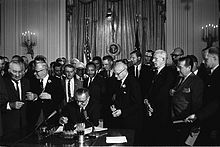Fifty years ago today, President Lyndon B. Johnson signed the Civil Rights Act into law.
The Civil Rights Act of 1964 (Pub.L. 88-352, 78 Stat. 241, enacted July 2, 1964) was a landmark piece of legislation in the United States that outlawed major forms of discrimination against blacks and women, including racial segregation. It ended unequal application of voter registration requirements and racial segregation in schools, at the workplace and by facilities that served the general public (“public accommodations”). Powers given to enforce the act were initially weak, but were supplemented during later years. Congress asserted its authority to legislate under several different parts of the United States Constitution, principally its power to regulate interstate commerce under Article One (section 8), its duty to guarantee all citizens equal protection of the laws under the Fourteenth Amendment and its duty to protect voting rights under the Fifteenth Amendment.
This year also marks the fiftieth anniversary of Freedom Summer, also known as the Mississippi Project, a campaign to register as many African-American voters as possible, especially in the state of Mississippi. That campaign was marked with violence by the locals directed against the outsiders. During the course of the 12 week campaign:
- four civil rights workers were killed (one in a head-on collision)
- at least three Mississippi blacks were murdered because of their support for the civil rights movement
- our people were critically wounded
- 80 Freedom Summer workers were beaten
- 1,062 people were arrested (out-of-state volunteers and locals)
- 37 churches were bombed or burned
- 30 Black homes or businesses were bombed or burned
The worst of the violence was the murder of three young civil rights workers, James Chaney, Michael Schwerner and Andrew Goodman, by members of the Klu Klux Klan.
When the men went missing, SNCC and COFO workers began phoning the FBI asking for an investigation. FBI agents refused, saying it was a local matter. Finally, after some 36 hours, Attorney General Robert F. Kennedy ordered an investigation. FBI agents began swarming around Philadelphia, Mississippi, where Goodman, Schwerner, and Chaney had been arrested. For the next seven weeks, FBI agents and sailors from a nearby naval airbase searched for the bodies, wading into swamps, and hacking through underbrush. FBI director J. Edgar Hoover went to Mississippi on July 10 to open the first FBI branch office there.
Throughout the search, Mississippi newspapers and word of mouth perpetuated the common belief that the disappearance was “a hoax” designed to draw publicity. The search of rivers and swamps turned up the bodies of eight other black men. Herbert Oarsby, a 14-year old youth, was found wearing a CORE T-shirt. Henry Hezekiah Dee and Charles Eddie Moore had been expelled from Alcorn A&M for participating in civil rights protests. The other five men were never identified. On August 4, 1964, the bodies of Chaney, Schwerner, and Goodman were found buried beneath an earthen dam.
Now five decades later, there is a concerted effort by the right wing, most white Republican, faction to end all that was achieved for equality that summer. At Esquire’s Politics Blog, Charles Pierce summarized why now more than ever we must get out the vote:
Over the weekend, I watched the PBS documentary on Freedom Summer, the effort 50 years ago to register African Americans to vote in the state of Mississippi, the effort that cost so many people so dearly, especially the families of Andrew Goodman, James Chaney, and Mickey Schwerner, who were beaten and shot to death, and buried in a dam, because the state of Mississippi had local police forces shot through with the Ku Klux Klan. Now, five decades later, with a Republican House far gone into nihilistic vandalism, and with the Senate hanging in the balance, and a Supreme Court one septuagenarian’s heartbeat away from a return to the golden days of the last Gilded Age, and a Democratic president in the White House on whom those responsible for the previous three phenomena have painted a bullseye, we keep hearing about how hard it is going to be for the Democratic party to turn out its voters this fall to take advantage of the opportunities for which Goodman, Chaney, and Schwerner gave their lives, and did so in my lifetime, not in a distant antebellum episode in some backwater.
Racism is not dead in America. It is very much alive. In a detailed article at Huffington Post, Braden Goyette and and Alissa Scheller prove that racism is a live and well and we, as Americans, are a long way from being post racial.
In his 2007 majority opinion limiting the use race to desegregate schools, Chief Justice John Roberts said “The way to stop discrimination on the basis of race is to stop discriminating on the basis of race.” Seven years later, Justice Sonia Sotomayor wrote a scathing dissent taking Roberts to the woodshed over the court’s upholding the affirmative action ban (pdf) adopted by Michigan’s voters. Calling Robers “out of touch with reality, she read her dissent aloud:
In my colleagues’ view, examining the racial impact of legislation only perpetuates racial discrimination. This refusal to accept the stark reality that race matters is regrettable. The way to stop discrimination on the basis of race is to speak openly and candidly on the subject of race, and to apply the Constitution with eyes open to the unfortunate effects of centuries of racial discrimination. As members of the judiciary tasked with intervening to carry out the guarantee of equal protection, we ought not sit back and wish away, rather than confront, the racial inequality that exists in our society. It is this view that works harm, by perpetuating the facile notion that what makes race matter is acknowledging the simple truth that race does matter.
We need to push all our representatives in local city and town councils, state legislatures and Congress to remember what so many gave their blood, sweat, tears and lives to win, Freedom for All.





Recent Comments